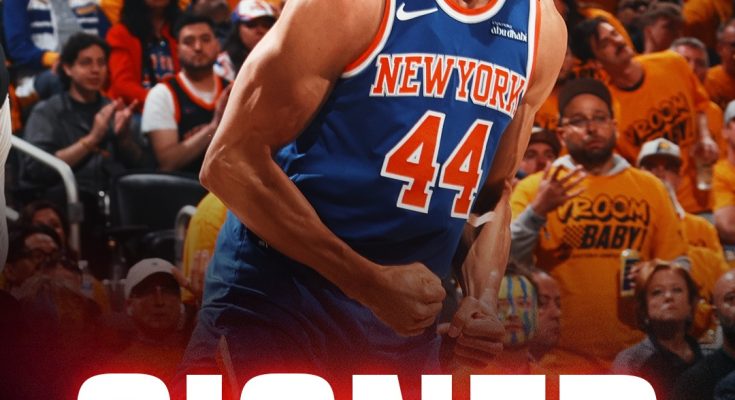According to NBA insider Shams Charania, the New York Knicks and guard Landry Shamet have reached an agreement for him to return to the team on a one-year deal. This news, while not on the level of a blockbuster signing or a superstar trade, is still a significant development for the Knicks as they continue shaping their roster for the upcoming season. Shamet’s return gives New York a steady and familiar presence who brings shooting, experience, and depth to the backcourt. For a team that has been on the rise in recent years under head coach Tom Thibodeau, the addition—or in this case, the reunion—with Shamet could be more impactful than it seems at first glance.
Shamet, a proven NBA veteran with a reputation as a reliable floor-spacer, is a player who has carved out a niche for himself across multiple teams in his career. He has worn the uniforms of the Philadelphia 76ers, Los Angeles Clippers, Brooklyn Nets, Phoenix Suns, and Washington Wizards before finding himself back in New York. Wherever he has gone, the narrative surrounding him has remained largely the same: he is a dependable three-point shooter who thrives in catch-and-shoot opportunities and provides valuable minutes off the bench. In today’s NBA, where shooting is the most sought-after commodity, Shamet’s skillset makes him a player teams always find use for, even if he is not a star.
For the Knicks, Shamet’s return addresses a few key areas. New York has been working to strengthen its perimeter shooting and overall offensive efficiency. While the team has been known for its grit, defense, and rebounding—qualities that embody Thibodeau’s coaching style—it has at times struggled to generate consistent offense, particularly from deep. Having a veteran shooter like Shamet gives them another option to spread the floor, create better spacing for their stars, and punish defenses that collapse on drives from Jalen Brunson or Julius Randle.
Brunson, the engine of the Knicks’ offense, thrives when the court is open and shooters are ready to knock down shots off his drives and kick-outs. Adding Shamet back into the mix ensures Brunson has one more dependable target on the perimeter. Shamet’s presence could also benefit Randle, who often attracts double teams in the post or when attacking the basket. Defenses will be more hesitant to overcommit if they know shooters like Shamet are waiting in the corners. It’s the kind of subtle adjustment that can open up the floor and make an offense flow more smoothly.
From a roster construction standpoint, Shamet’s return is a low-risk, high-reward move. A one-year deal gives the Knicks flexibility, ensuring they are not locked into a long-term commitment while still gaining the benefits of his contributions. If Shamet performs well, he could earn a longer stay or even boost his trade value as a reliable veteran asset. If things do not work out as planned, the Knicks can easily move on next offseason without any significant financial consequences. In a league where cap space and roster flexibility are paramount, this kind of short-term deal makes sense for both player and team.
For Shamet himself, the move offers a chance at stability and a clear role. Throughout his career, he has bounced between multiple organizations, sometimes struggling to find a consistent home. In New York, he has the opportunity to carve out a niche as a trusted role player in a system that values his strengths. Playing under Thibodeau, Shamet will be asked not only to shoot but also to bring energy defensively, an area where his effort and awareness could help him earn more minutes. While he may not be a lockdown defender, Thibodeau’s teams are built on collective effort, and Shamet’s willingness to buy into that system could make him more valuable than in other situations.
There’s also the question of timing. The Knicks are entering a season where expectations are higher than they have been in years. With Brunson blossoming into an All-Star level guard, Randle continuing to be a force in the frontcourt, and young talents like RJ Barrett developing, New York is no longer seen as a fringe playoff team but as a legitimate contender in the Eastern Conference. Every piece matters, and role players often end up swinging playoff games. Shamet’s ability to knock down a big three in a pressure moment could make all the difference in a tightly contested series.
Fans may remember that some of the Knicks’ most recent playoff exits came down to their inability to consistently hit perimeter shots. Opposing defenses dared them to win from outside, and too often, New York could not convert at the rate necessary to keep up with elite teams. Bringing in someone with Shamet’s track record is a direct response to that weakness. It’s a calculated move that may not grab headlines but could solve a real problem.
The deal also speaks to the Knicks’ front office strategy. President Leon Rose and general manager Scott Perry have shown patience in building the roster, avoiding the temptation to make rash moves that could mortgage the future. Instead, they’ve looked for complementary pieces to add around their core, prioritizing fit and chemistry. Shamet’s return fits this mold perfectly. He’s not a star, but he doesn’t need to be. He just needs to fill a role, play his part, and contribute to winning basketball. That’s the kind of depth that turns good teams into great ones.
It’s worth noting that Shamet has had his share of struggles, too. Injuries and inconsistent shooting stretches have at times derailed his momentum. He has not always been able to stay on the floor, and when his shot isn’t falling, his value can diminish quickly. For this reunion with New York to be successful, the Knicks will need him to stay healthy and find consistency. Conditioning and rhythm will be key, as will Thibodeau’s ability to manage his minutes effectively. Fortunately, the Knicks have enough depth that Shamet won’t be asked to carry too heavy a load. His role is clear and defined, which could help him thrive.
Beyond the tactical side, Shamet’s presence could also bring leadership to the locker room. Having been part of several playoff teams across different organizations, he brings perspective and experience. Younger players on the Knicks can learn from his professionalism and preparation. In a league where culture is often as important as talent, having steady veterans can make a meaningful impact. Shamet is not flashy, but he’s dependable, and that kind of steadiness can be invaluable over the grind of an 82-game season.
From the fan perspective, reactions are likely mixed. Some may see this as a modest move that won’t dramatically shift the team’s fortunes, while others will appreciate the practicality of it. Knicks fans, known for their passion and high expectations, want to see big moves that signal championship intent. But savvy fans understand that building a contender is about more than star power. It’s about the accumulation of role players who fit seamlessly and can be trusted in critical moments. Shamet fits that mold.
In many ways, Shamet’s career mirrors that of a classic role player in the modern NBA. He may never make an All-Star team or be the face of a franchise, but his contributions are felt in subtle, essential ways. Every team needs players who can space the floor, hit shots under pressure, and bring a professional approach every night. His reunion with the Knicks is a reminder that sometimes the best moves aren’t the ones that dominate headlines but the ones that quietly solve problems and strengthen the team as a whole.
As the season approaches, attention will turn to how Shamet integrates into the rotation. Will he be a regular contributor off the bench? Will he find chemistry quickly with Brunson and the rest of the core? Can he provide enough shooting to make defenses respect him consistently? These questions will determine the ultimate success of the signing. But the foundation is there for a productive partnership. Shamet has the tools, and the Knicks have the need. It’s a pairing that makes sense on paper, and now it’s up to both sides to turn that potential into reality.
Ultimately, the Knicks’ decision to bring back Landry Shamet for a one-year period underscores their commitment to building depth, addressing weaknesses, and preparing for the challenges ahead. It may not be the kind of move that dominates the news cycle, but it’s the kind of move that good teams make—thoughtful, strategic, and aimed at maximizing the roster’s overall effectiveness. Shamet’s shooting, experience, and professionalism could prove invaluable as the Knicks aim to make noise in the Eastern Conference. For Shamet, it’s a chance to find stability, contribute meaningfully, and re-establish himself as a trusted role player in one of the league’s biggest markets. Time will tell how this reunion plays out, but for now, it feels like a win-win for both player and team.



